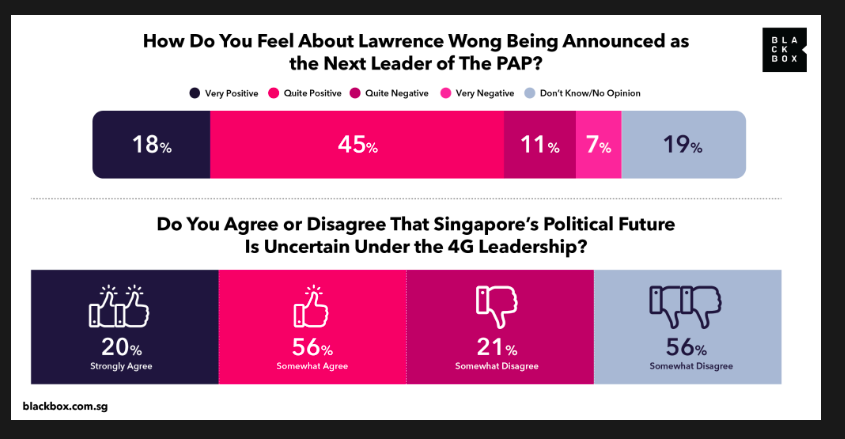A recent survey is showing that Singaporeans rank high costs of living and climate change among their top five concerns.
Additionally, while Prime Minister-in-waiting Lawrence Wong appears to enjoy the support of many, respondents did not quite extend this to the rest of the ruling People’s Action Party’s 4G, or Fourth Generation, of leadership.
The poll, Emerging from the Pandemic – The New Mood in Singapore, was conducted by Blackbox Research and explores how the attitudes, behaviours, and expectations of people in Singapore are changing in these times.
Blackbox notes that this is the “first major post-pandemic public poll covering current issues,” and added that “there is a big reset going on with major challenges at hand for the Singapore Government.”
The study revealed that only 44 per cent of the 750 adult Singaporeans are optimistic that this year will be a better year for them economically.
However, a far greater number, 84 per cent, still believed that the country is generally headed in the right direction. This number is highest among Singaporeans aged 20-34 who were polled, with 91 per cent saying so.
As for the country’s next leader, a solid 63 per cent of those polled said they were positive about Lawrence Wong being the chosen one. However, a higher number said they believe the county’s “political future is still uncertain as the 4G leadership takes on more responsibility.”

This may be reflective of the respondents’ views on how the government is handling cost of living and inflation issues, as more than 55 per cent don’t believe it is doing enough.
Respondents were none too happy about how housing is being handled, with 48 per cent saying they think the government is doing a poor job when it comes to housing affordability.
But what many respondents worry the most about are the cost of living and rising inflation, with 91 per cent saying inflation has had an impact on their lives—specifically when it comes to fuel prices, utility prices, supermarket prices, costs at food courts, or hawker centres and taxis or PHVs.
Thirty-per cent of those polled said that inflation isn’t just affecting Singapore, but believe it is the number one threat in the world today, ranking it higher than climate change (16 per cent), the potential of the Russia-Ukraine conflict spreading (13 per cent), the emergence of new COVID strains (12 per cent), and global food shortages (7 per cent).
Two additional key takeaways from the study are the following:
When it comes to career choices, 59 per cent of respondents said that employees have better prospects when beginning their careers in start-ups instead of more established organisations.
Also, some behaviours that began during the pandemic appear to be carried over, such as online shopping, food delivery, digital and payment channels.

“As Singapore continues to remodel itself into a cosmopolitan global city with a population carrying much higher aspirations, new tensions are inevitable. Singaporeans are already having to adjust to the new reality of rising living costs, escalating home prices, ongoing economic/business transformation, and a seemingly endless quest to meet the challenges of the future. How we go about successfully transitioning into this new era is going to be a big test for the Government and the broader Singapore community,” said David Black, the founder and CEO of Blackbox Research.
/TISG
Majority of Singaporeans agree that ‘SG is becoming an unaffordable place to live’ — New Study

